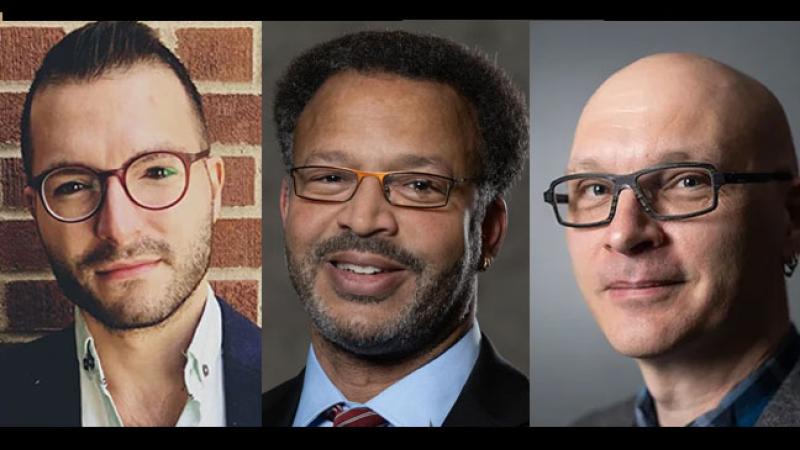April 19, 2024

For the 2023-2024 academic year, Rensselaer’s Science and Technology Studies Department experienced significant growth with the addition of three new faculty members. Tankut Atuk, Ph.D., is an interdisciplinary scholar whose research is situated at the intersections of public/global health, medical sociology/anthropology, social epidemiology, and sexual health. Adam Biggs, Ph.D., focuses on race, civil rights, and the history of medicine. Matthew Wolf-Meyer, Ph.D. is an anthropologist and historian of science and medicine in the U.S.
Scholars in Science and Technology Studies (STS) are experts in the ethical, legal, and social dimensions of science, medicine, computing, and engineering. The mission of the Science and Technology Studies Department at Rensselaer is to apply this expertise toward research, teaching, and design for sustainable and equitable futures.
Atuk is an assistant professor of sociology of public health and medicine at Rensselaer teaching Critical Public and Global Health and Sociology, in addition to graduate courses toward the Ph.D. in Science and Technology Studies. He holds two master’s degrees in Gender Studies and Sociology and he earned his doctoral degree from the University of Minnesota. Atuk’s current book project looks at the socio-political dimensions of an exponentially growing HIV epidemic in Turkey where public health has become a pathogenic technology. Through community-engaged and activist research, he seeks to understand and redress the ways in which the formal actors of public health leave HIV-negative people, particularly LGBTI+ communities, susceptible to HIV infection and HIV-positive people defenseless against socio-medical violence.
In addition to this project, Atuk is starting a new investigation at the intersections of AI, telehealth, and health justice. To investigate the possibilities and limits of responsible and ethical AI, he is analyzing a series of case studies on how healthbots, chatbots used in healthcare, and telehealth platforms reproduce and transform existing inequalities embedded in medicine.
Biggs examines how definitions of academic and professional merit are shaped by racial politics and explores how early-20th century Black doctors used professional medicine to advocate for racial justice. Biggs teaches American History; History of Race, Science, And Medicine; graduate courses toward the Ph.D. in Science and Technology Studies; and he guides the Racial Justice Lab at Rensselaer.
Before arriving in Troy, he served in post-doctorate positions at the Scarlet and Black Research Center, Rutgers University, and in the Department of the History of Medicine at Johns Hopkins School of Medicine. He has also served on the faculty at the University of South Carolina Lancaster and Claflin University. Biggs received his Ph.D. from the American Studies program at Harvard University.
Wolf-Meyer marries ethnographic research with patients, their families, and patient support networks, participant-observation of scientists, clinicians, and health care workers, and archival analysis of scientific monographs and public policies to show how thorny, contemporary problems have developed out of longstanding ideas about health and disease, disability and normalcy, and nature and civilization. He holds dual master’s degrees in American cultural studies and science fiction studies and earned his Ph.D. in anthropology from the University of Minnesota. At Rensselaer, he teaches The Biology of Everyday Life, Human Futures, as well as graduate courses toward the Ph.D. in Science and Technology Studies.
Across his research, Wolf-Meyer focuses on how personhood and subjectivity are produced and transformed over the life course. This includes concerns about how the care of children and the elderly reflect cultural expectations of what it means to be normal, how the structure of families and other institutions reflect social concerns, and how attention to experiences of disability and illness can help build more inclusive societies. His books include The Slumbering Masses: Sleep, Medicine, and Modern American Life (2012), Theory for the World to Come: Speculative Fiction and Apocalyptic Anthropology (2019), Unraveling: Remaking Personhood in a Neurodiverse Age (2020), and American Disgust: Racism, Microbial Medicine, and the Colony Within (2024).
Together, the new faculty members will advance Rensselaer’s commitment to health-related concerns in the STEM fields. All are interested in pursuing research collaborations across campus with faculty interested in health- and discrimination-related research.
“Rensselaer’s Science and Technology Studies Ph.D. program is one of the top programs of its kind in the world,” said Abby Kinchy, head of the department. “I’m thrilled to see the growth of our department with these three new esteemed faculty members, and the energy that they bring is amazing. Our students will benefit greatly from their expertise and guidance.”